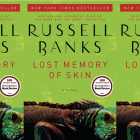Trying to Write the Southern Accent
Guest post by Megan Mayhew Bergman
Confession: I used to hate forms that asked for your place of birth, because I had to write Gaffney, South Carolina–a city best known for its stucco outlet malls and peach-shaped water tower that some refer to as “the ass in the sky.” I’ve lived most of my life not far from I-95, the southern portion of the highway saddled with South of the Border billboards and franchised barbecue joints advertised by bug-eyed pigs on roadside signs. When I have to, I speak Southern.
Last year, I moved to Vermont after thirty years of Southern living. Behind the Raleigh neighborhood I left was beautiful, historic Oakwood Cemetery, founded in 1869 and home to 1500 Confederate graves. The Old South was all around us there, in the azaleas, the awkward Civil War reenactments, the hundreds of Victorian-era homes of the neighborhood, and the obelisk memorializing the Confederate dead. Yet New England retirees populated the neighborhood with drought-resistant landscaping, rain barrels, and biodiesel vans parked in the driveways of their antebellum houses. On my street, the quintessential Bubba lived next door to a gay couple who drank wine on their porch while he washed his truck and played with his amateur radio station. I loved watching the culture collision unfold.
The urban South, I believe, is wrestling with an identity crisis. It reminds me of the sign on a downtown Raleigh biscuit joint, Biscuit Station: country good and city fast. In the urban and suburban South, many locals live in close proximity to shopping centers and start their mornings with store-bought lattes, but like me, many had grandmothers who picked tobacco and uncles that made moonshine, mothers and fathers that raised them with thick accents. Like me, they remember when the South was more regionally distinctive, but they have since assimilated to a time where a shopping center in New Jersey could be a shopping center in North Carolina. Suburbia feels modular–most people have access to the same ideas, chain food stores, and clothes. The once stark regional identity is quickly becoming more generic.
However, in writing workshops I often see people trying to write Southern accents, as if a character living below the Mason-Dixie line still necessitates a phonetic dialogue guide for readers. It’s tempting, it’s been done well before, and I’m not saying it shouldn’t be done in 2010 and onward. I’m suggesting it should be done sparingly and only if:
A) You know enough about Southerners to write it well–nothing reveals a tin ear like bad Southernese. Think Nicolas Cage in Con Air.B) The character has earned it–by being an older southerner, living in a marginalized or bottlenecked environment, or consciously choosing Southern mannerisms. (See the NC Language and Life Organization‘s videos on the brogue still used on North Carolina’s Coast).C) You are George Singleton or Barry Hannah.
I believe the number of Southerners with writeable accents is declining. Writing Southernese is as much about the arrangement of words and word choice as it is the sound. You don’t have to underscore a character’s southern-ness by dropping g’s and throwing in a bunch of Populist apostrophes after n’s–as in, I’m fixin’ to go ridin’ with Billy Bob. If the character hasn’t earned it, or you aren’t masterful, the phonetic hand-holding tortures readers–the economic use of y’all or original word arrangement (like a double modal) will do in most cases.
Take this example of how word choice, as opposed to a writeable accent, works–a line from a George Singleton interview about an old school southerner seeing llamas for the first time: “What the hell kind of donkeys is them?” Or a line from Barry Hannah’s Yonder Stands Your Orphan: “You’re all wore out from being nice.” We don’t need to see how these lines were phonetically delivered–we know. Sound is important, but if an author makes it too important, the concern tends to mock the character.
When writing Southern characters in 2010, authors must consider the age of the character–older, native Southerners are much more likely to have writeable accents than an average character of Generation Y or younger. Educated Baby Boomers who have lived in other regions or have traveled extensively will likely speak with moderate accents, if any. (All accents, in my opinion, are a risk to write phonetically–particularly moderate ones. What’s the payoff for clunky apostrophes and misspellings if your setting and character development are strong enough?) Generation Z, or the Millineals, are much less likely to have an accent given their connectedness with the world and information, unless, like some of Singleton’s characters, they live down a one-way asphalt mountain street lined with outhouses in Appalachia.
I acknowledge that most people who were born in the South, attended college there, and have never lived above the Mason-Dixon Line still have recognizably Southern ways of speaking. But do they merit written accents? I can look across three generations of my family and see significant variations in accent and word choice (our accents are a mix of non-rhotic Virginia Piedmont and Coastal Southern) and only Grandma would earn a slightly writeable accent. (*Disclaimer – I only make rules for accents I know. Creole or Gullah–another story.)
Southern literature–and in turn, any writeable accent–owes a debt to what is referred to by the editors of Stories of the Modern South as “a strong oral tradition of storytelling in the South.” I think that oral tradition is more pronounced in older, lifelong inhabitants of the South. Both my grandmother and my father could keep dinner tables laughing with their sing-songy tales of drunk uncles on tricycles and pool games gone awry. I can hear my grandmother’s redneck, yet lyrical, meter when I write, as well as the sound of hymns, my Baptist preacher’s voice: Go now and be involved in the world. I think of my grandfather’s vocation as an auctioneer, half-shouting, half-singing tobacco prices over piles of golden leaves, voice like a jaw harp.
My grandmother said things like, “over yonder,” “rightchere,” (right here), “likeyat,” (like that), and “haint” (spook). Any non-sleeping dog had a “wild hare up its ass,” and if Grandma was angry, she was “some kinda burnt up.” She was prone to redundant modal verbs (“I done told you before”) and a big fan of the circumfix “a-in”–such as an owl “ahootin’ and ahollerin’.” Similar to Barry Hannah and Singleton’s backwoods characters (consider Hannah’s use of “sumbitch” or “You’re all wore out from being nice,” in Yonder Stands Your Orphan), my grandmother would speak the same way in front of her family as she would royalty–period.
Until high school, my own accent was deeply committal–full of y’alls and drawn out “cutes.” In college it migrated to some sort of sorority girl-approved neutrality zone. Now, when I drink, get mad, or talk to old people, my relatives, or the Bubba who used to live across the street, I might use my accent or let a sympathetic drawl slip. I’m aware of the fact that my accent can put someone at ease or, alternatively, cause someone to assume my allegiance to the Southern woman stereotype.
I think we judge people and characters by the way they speak. Any character with an in-your-face, spelled-out accent in 2010 is going to come under scrutiny for that same reason (aka: Why does this otherwise reasonable school teacher talk like Barney Fife? Why do I need to pay such extreme attention to his accent? Is he of low IQ? Love child of Jesse Helms?); the author has to make sure a reader’s scrutiny pays off. Otherwise the dropped g’s and apostrophe-after-n’s are a heavy-handed move, or worse, the hallmarks of a Southern caricature. If a writer has done the work with setting, character development, and word choice, the reader should “hear” the speech just fine.
This is Megan’s fourth post for Get Behind the Plough.



